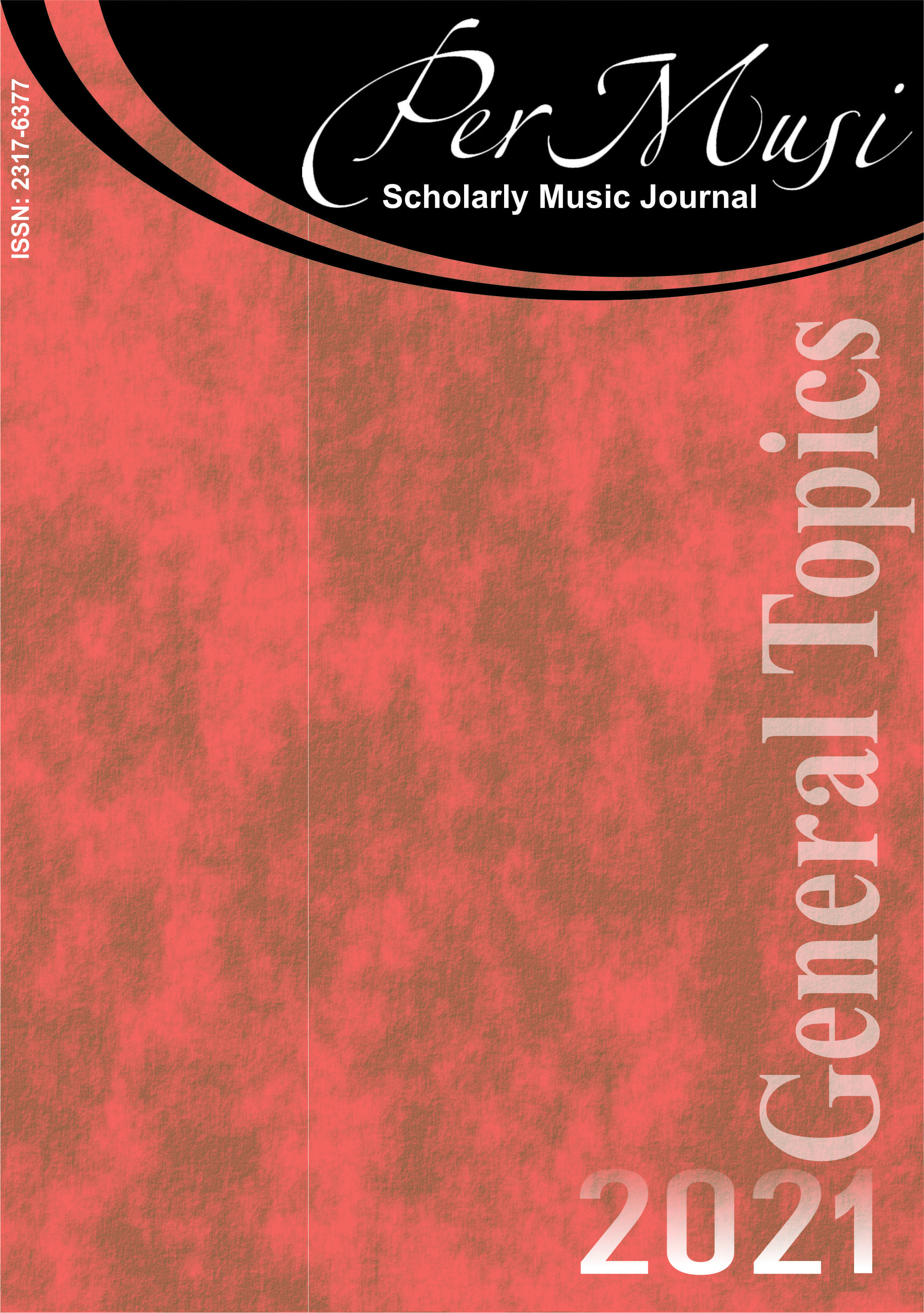Vocal interpretation and creation processes
DOI:
https://doi.org/10.35699/2317-6377.2021.35863Keywords:
Creation processes, Singers, Composers, Umwelt, SelfAbstract
This paper addresses aspects related to the singer’s creation processes and brings also their dialogue with the composers’ creation work, which includes the issues of Umwelten (Vieira 2008, 2009), the Peircean concepts of subject and self (Colapietro 1989, 2003), the concept of miscegenation (Laplantine and Nouss 2002), supports (written or oralized), and ecological perception, as conceptualized by J. Gibson (1979). In order to contribute to the reflection on these aspects, some testimonies from singers about their interpretative creations of the Canção de Amor [Song of Love], by Villa-Lobos, were brought. The objective is to expose the details of their creative processes, otherwise inaccessible to the public. These testimonies are part of our doctoral thesis defended in the line of research of Creative Processes. We also refer to resources from the processes criticism and nets of creation by Cecilia Salles (2006, 2008, 2010, 2011).
Downloads
References
Clarke, Eric. 2005. Ways of listening: an ecological approach to the perception of musical meaning. New York: Oxford University Press.
Colapietro, Vincent Michael. 1989. Peirce’s approach to the self: a semiotic perspective on human subjectivity. Nova York: State University of New York Press.
______. 2003. “The loci of creativity: fissured selves, interwoven practices”. In Manuscrítica revista de crítica genética 11. 59-82.
Davidson, Jane. 1991. The perception of expressive movement in music performance. Tese de Doutorado em Filosofia. Londres: Departamento de Música da City University. 367 p.
Ferraz, Silvio. 2007. Notas, atos, gestos. São Paulo: 7 Letras.
Gibson, James J. 1979. The ecological approach to visual perception. Boston: Houghton Mifflin.
Gibson, James J. 1966. The senses considered as perceptual systems. Londres: George Allen & Unwin Ltd.
Laplantine, François, e Nouss, Alexis. 2002. A mestiçagem. Lisboa: Instituto Piaget.
Lockwood, Lewis. 2005. Beethoven: a música e a vida. São Paulo: Conex.
Pinheiro, Amalio (Org.). 2009. O meio é a mestiçagem. São Paulo: Estação das Letras e Cores.
Salles, Cecilia. 2010. Arquivos de criação: arte e curadoria. Vinhedo: Editora Horizonte.
______. 2008. Crítica genética: fundamentos dos estudos genéticos sobre o processo de criação artística. São Paulo: EDUC.
______. 2011. Gesto inacabado: processo de criação artística. São Paulo: Intermeios.
______. 2006. Redes da Criação: construção da obra de arte. Vinhedo: Editora Horizonte.
Tragtenberg, Lucila. 2012. Processos de criação da interpretação vocal em rede. Tese de Doutorado. São Paulo: Pontifícia Universidade Católica. 208 p.
Vieira, Jorge A. 2008. Teoria do conhecimento e arte. Fortaleza: Expressão Gráfica e Editora.
______. 2009. “Teoria do conhecimento e arte”. In Música Hodie 9 (2). 15.
Zampronha, Edson. 1998. Notação, representação e composição: um novo paradigma da escritura musical. Tese de Doutorado. São Paulo: Pontifícia Universidade Católica. 291 p.
Published
How to Cite
Issue
Section
License
Copyright (c) 2021 Per Musi

This work is licensed under a Creative Commons Attribution 4.0 International License.

Except where otherwise noted, contents on this site are licensed under a Creative Commons - Atribuição 4.0 Internacional.


